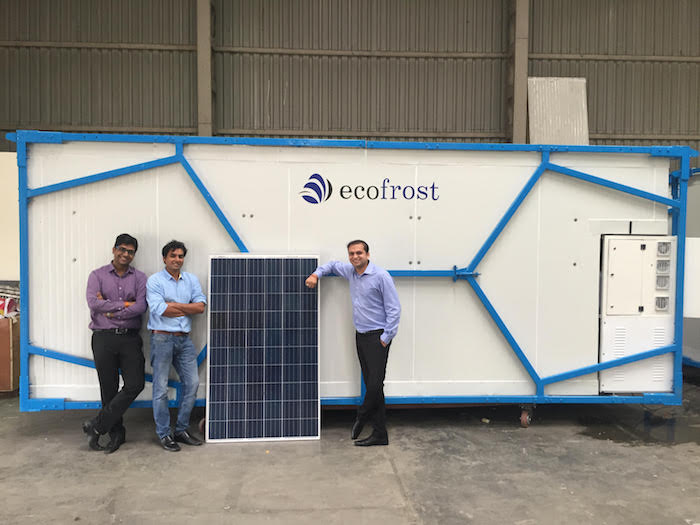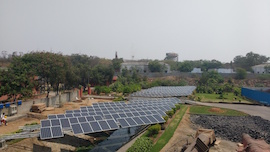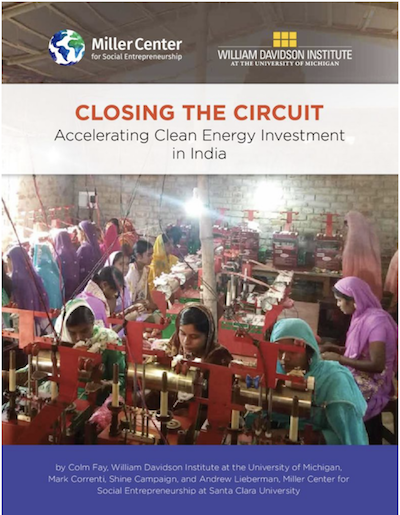New WDI Paper On Energy Access To Debut At India Event
Thursday, August 23, 2018

Ecozen Solutions, which has developed a solar powered cold storage system, is a company that participated in the research project. (Image courtesy of Ecozen Solutions)
WDI and the Miller Center for Social Entrepreneurship at Santa Clara University will mark the release of a new paper exploring what enterprises and investors have learned about energy access in India with an event on Sept. 6 in Delhi.
The paper, “Closing the Circuit: Accelerating Clean Energy Investment in India,” is based on the experiences of enterprises and investors involved in the Energy Access India (EAI) program. EAI is a three-year, USAID-funded program intended to narrow the gap between clean energy enterprises and investors. The program provides access to knowledge and mentorship that boosts enterprises’ investor readiness and by facilitating more funding to these enterprises.

A Freyr Energy solar plant in India, one of the companies included in the research. (Image courtesy of Freyr.)
EAI program’s broader goal is to provide energy access to some of the approximately 300 million people in India who lack access by helping private energy enterprises develop innovative business models to achieve sustainability at scale. The program provided acceleration services to 26 energy enterprises in the country that represent a range of technologies and business models. The enterprises have achieved varying levels of success in growth, impact, and financial sustainability.
“Our collaboration with WDI helped discern key lessons from accompanying over 30 social enterprises focused on clean energy access,” said Thane Kreiner, executive director of Miller Center for Social Entrepreneurship. ”We hope this report will help clean energy enterprises connect with impact investors who want to increase energy access for India’s poorest people, and thereby transform their lives.”
The paper highlights opportunities for greater alignment between enterprises and investors. It also:
- Analyzes the business models and strategies that EAI portfolio companies implemented
- Identifies commonalities in the trajectory that many enterprises followed in their evolution
- Identifies barriers and opportunities for investment in clean energy enterprises in India
- Provides some actionable recommendations for enterprises and investors to influence the development of the overall ecosystem
WDI’s Colm Fay, who heads the Institute’s Energy initiative and is lead author on the paper, said the Sept. 6 discussion at the Royal Plaza hotel in New Delhi will focus on what the EAI enterprises have learned about how to develop commercially viable models and strategies, as well as what patterns are emerging. Attendees will also talk about some of the paper’s recommendations to spur discussion.
“We’re hoping that the event attendees can take the recommendations we’ve developed in the paper, and determine the resources and partnerships required to put them into action, and the next steps to get there,” Fay said.
 The research and subsequent paper on the EAI program is the first project of WDI’s fledgling Energy initiative. Fay said there are other current projects with graduate students at U-M’s School for Environment and Sustainability, U-M’s Erb Institute for Global Sustainable Enterprise and with faculty across the U-M campus.
The research and subsequent paper on the EAI program is the first project of WDI’s fledgling Energy initiative. Fay said there are other current projects with graduate students at U-M’s School for Environment and Sustainability, U-M’s Erb Institute for Global Sustainable Enterprise and with faculty across the U-M campus.
The initiative works with individuals and enterprises that are developing innovative approaches to power generation, and connects them with the expertise, knowledge, and tools to design commercially viable business models and build profitable enterprises. WDI’s Energy initiative works with University of Michigan faculty, students and other collaborators to increase access to energy in low- and middle-income countries, and to develop innovative models or technologies that can reduce reliance on non-renewable energy sources.
“Our goal with the Energy Initiative is to combine the technical expertise we have access to across the U-M campus, with WDI’s experience in business model innovation in emerging markets to support the development of enterprises that are commercially viable, while also increasing access to renewable energy,” Fay said.
